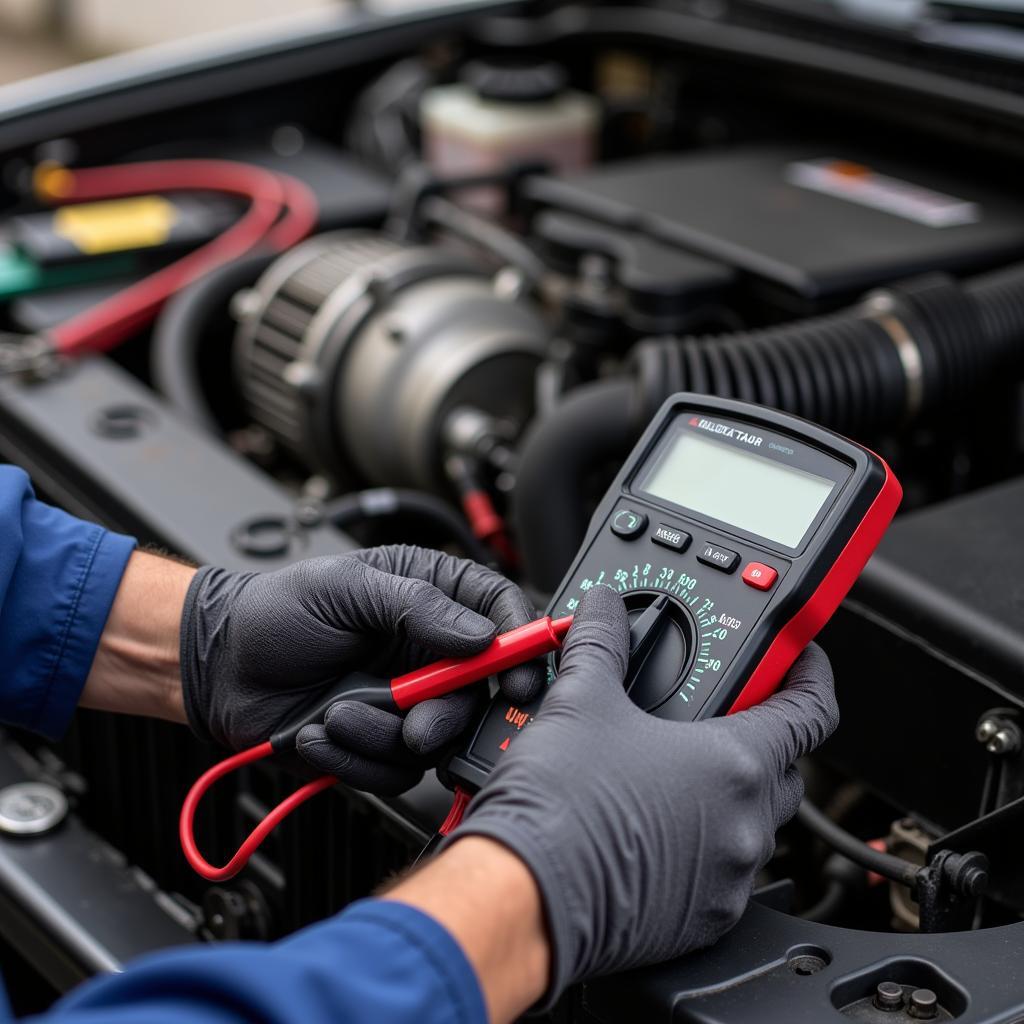Is your car battery constantly dying, especially during hot weather? Your car AC might be the culprit. A malfunctioning AC system can put a significant drain on your car battery, leaving you stranded. This article delves into the common reasons why your car AC is draining your battery and offers practical solutions to fix the problem.  Car AC Draining Battery: A mechanic inspecting a car's AC system and battery.
Car AC Draining Battery: A mechanic inspecting a car's AC system and battery.
Common Reasons Your Car AC Drains Your Battery
There are several reasons why your car AC might be draining your battery. Some of the most common culprits include:
- Faulty AC Compressor: The AC compressor is the heart of your AC system. If it’s failing, it can draw excessive power from the battery, leading to a drain. Signs of a failing compressor include unusual noises, leaks, or the AC not blowing cold air.
- Bad AC Relay: The AC relay acts as a switch, controlling the power flow to the compressor. A faulty relay can cause the compressor to run continuously, even when the car is off, draining the battery.
- Electrical Issues: Wiring problems, such as corroded connections or damaged wires, can create a short circuit that drains the battery. This is especially true in older cars.
- Parasitic Drain: Even when the car is off, certain components continue to draw a small amount of power. This is known as parasitic drain. If the AC system has a fault, it can contribute to this drain, gradually depleting the battery.
- Overcharged or Undercharged Battery: A weak or failing battery can struggle to power the AC system, particularly if it’s old or hasn’t been properly maintained. Even a slight imbalance can lead to further issues. This can sometimes be mistaken for the AC draining the battery.
If you experience issues after installing a new car radio, consider checking out our guide on car radio USB Bluetooth receivers. car radio usb bluetooth receiver It might help diagnose potential connectivity problems.
How to Diagnose Car AC Battery Drain
Identifying the exact cause of the battery drain requires some troubleshooting. Here’s a step-by-step guide:
- Check the Battery: Start by testing your battery with a multimeter. This will tell you if the battery itself is faulty.
- Inspect the AC Compressor: Listen for unusual noises coming from the compressor. Look for leaks around the compressor and check if the AC is blowing cold air.
- Test the AC Relay: Locate the AC relay and test it using a multimeter. A faulty relay will show no continuity.
- Check for Parasitic Drain: Use a multimeter to measure the current draw with the car off. A high reading indicates a parasitic drain.
- Inspect the Wiring: Carefully examine the wiring connected to the AC system for any signs of damage or corrosion.
Fixing the AC Battery Drain
Once you’ve diagnosed the problem, here are some solutions:
- Replace the AC Compressor: If the compressor is faulty, it needs to be replaced. This is best done by a qualified mechanic.
- Replace the AC Relay: Replacing the relay is a relatively simple and inexpensive fix.
- Repair or Replace Wiring: Damaged or corroded wires should be repaired or replaced to prevent further issues.
- Address Parasitic Drain: Identify and fix the source of the parasitic drain. This could involve repairing a faulty component or disconnecting unnecessary accessories.
- Charge or Replace the Battery: Ensure your battery is properly charged. If it’s old or damaged, consider replacing it with a new one.
Experiencing starting problems after a battery replacement? Our article on car not starting after replacing battery might offer helpful insights.
“A common mistake people make is assuming the battery is the problem when the AC stops working,” says David Miller, a senior automotive electrical technician with 20 years of experience. “Often, it’s a faulty component within the AC system that’s draining the battery.”
How to Prevent Car AC Battery Drain
Preventing battery drain is easier than fixing it. Here are some preventative measures:
- Regular AC Maintenance: Get your AC system serviced regularly to ensure it’s working efficiently.
- Clean Battery Terminals: Keep your battery terminals clean and free from corrosion.
- Turn Off AC Before Shutting Off the Engine: This simple habit can prevent unnecessary strain on the battery.
- Park in the Shade: Parking in the shade can reduce the load on your AC system, minimizing battery drain.
Conclusion
A car AC draining battery is a common problem with several potential causes. By following the diagnostic steps outlined in this article and taking preventative measures, you can keep your AC running smoothly and avoid getting stranded with a dead battery. Remember, regular car AC maintenance is key to a healthy battery.
If you’re struggling to connect a Bluetooth speaker to your Jensen car radio, this article on bluetooth speaker to use with a jensen car radio may be just what you need.
FAQ
- How can I tell if my car AC is draining my battery? If your car battery frequently dies, particularly during hot weather when you use the AC often, it’s a strong indication that your AC might be the culprit.
- Can a bad AC relay drain my car battery? Yes, a faulty AC relay can cause the compressor to run continuously, even when the car is off, leading to significant battery drain.
- How much should a car AC drain the battery? A properly functioning AC system should not excessively drain the battery. A significant drain indicates a problem within the AC system or the battery itself.
- Will turning off the AC save my car battery? Turning off the AC before turning off the engine can help prevent unnecessary strain on the battery, especially if there’s a minor issue with the AC system.
- How often should I get my car AC serviced? It’s recommended to get your car AC serviced at least once a year, ideally before the start of the hot season.
- Can a low refrigerant level drain my car battery? A low refrigerant level can cause the AC compressor to work harder, potentially increasing the strain on the battery.
- Can I fix a car AC draining battery problem myself? Some fixes, like replacing a relay, are relatively simple. However, more complex issues, like a faulty compressor, require professional attention.

